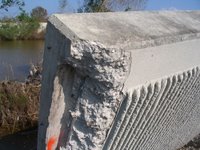Lies and Secrecy: How Our Senators Plan On Rebuilding New Orleans

Louisiana's U.S. senators Mary Landrieu and David Vitter recently proposed a bill that would create a committee to oversee the U.S. Army Corps of Engineers' projects to rebuild New Orleans' flood control infrastructure. A large part of this bill would exempt future federal projects implemented under this committee's control from existing environmental regulations, specifically the National Environmental Policy Act (NEPA) and the Clean Water Act. Foolishly, our senators, as well as our former U.S. senator J. Bennett Johnston, have told congress and others that environmental regulations are responsible for the flooding of New Orleans and that these regulations have led to a lengthy process of providing adequate protection.
Of course, none of this is true. NEPA and the Clean Water Act regulations are largely procedural and their main purpose is simply to describe a project to the public in layperson terms and disclose the potential impacts of that project on the human and natural environment. That is it; these regulations do nothing else. They cannot stop, change or even slow a project; only public input as a result of disclosure is capable of doing those things. Typically projects only get slowed or stopped by environmental regulations when the actual proposed action and its impacts are disclosed, and the general public becomes outraged by the likely outcome of the proposed project. Many projects built before these environmental regulations (e.g., Mississippi River Gulf Outlet) so outrage the public that the public often cannot understand how they ever got built. So, if you are a politician and you don't like your constituents meddling in large projects with big dollars (and contracts) involved that could, and likely would displace people, destroy historic and cultural resources, alter aesthetics and harm fish and wildlife resources, you naturally want to waive the "problematic environmental laws" because these laws would force public disclosure of federal actions.
Levees in New Orleans did not fail because of environmental regulations. Obviously having to write an Environmental Impact Statement for the 17th Street Canal flood protection improvements did not lead to its failure during Katrina. Only bad designs or poor construction are capable of causing levee/floodwall failure. Flood protection projects for New Orleans previously proposed by the U.S. Army Corps of Engineers that would have provided greater levels of protection then New Orleans had at the time of Katrina were not stopped by environmental regulations, but instead were stopped by inadequate funding by the same congressional leaders who now want to waive environmental regulations for similar projects.
In the rush to provide adequate flood protection for New Orleans, make sure you ask yourself a simple question: Do you trust your local, state and federal agencies, and elected officials to create and implement the perfect projects without any public disclosure of what those projects will be or what level of impacts they will have? If environmental laws such as NEPA and the Clean Water Act are exempted for future projects, hundreds of millions to billions of dollars will be spent on projects without your input, and resources that are important to you and your family will likely be destroyed without your knowledge. There is nothing like those type of secret dealings to truly make you feel like a Louisiana resident.

1 Comments:
First, thanks for the link to Wet Bank Guide. I haven't gotten around to this story yet, but you should note that the federal government has been casting around for ways to blame the environmentalists for causing the flooding by blocking past projects, most notably the Rigolets barrier. See this article for more info: http://www.clarionledger.com/apps/pbcs.dll/article?AID=/20050916/NEWS0110/509160369/1260
Post a Comment
<< Home